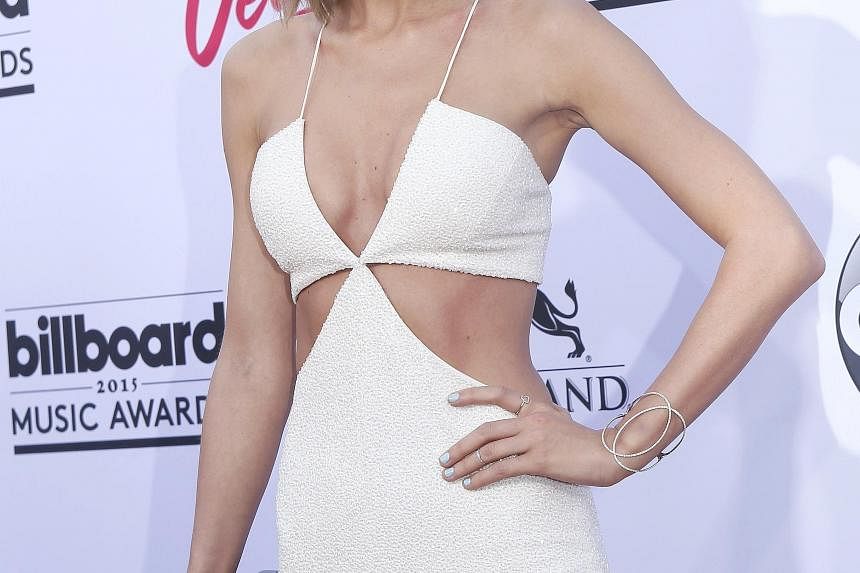Los Angeles - Taylor Swift's lightning- quick victory over Apple Inc demonstrates how high-profile artists can use public shaming to shape the music business when even major record labels haggling behind the scenes cannot.
The biggest music companies, after months of negotiations, could not convince Apple to pay royalties during a three-month trial period, according to people with knowledge of the matter.
Before Swift spoke up, other major artists privately threatened to pull their albums from Apple's new service, said the people, who were not authorised to discuss the matter publicly.
Armed with a best-selling album and a Tumblr account, Swift got the job done in 17 hours. On Sunday morning, she wrote a diplomatic but stern Tumblr post taking Apple to task for not paying royalties on test drives of its new streaming music service, set to open on June 30.
"We don't ask you for free iPhones," she wrote. "Please don't ask us to provide you with our music for no compensation."
By midnight on Sunday, Apple - one of the most powerful companies in the world - had capitulated to the 25-year-old, saying it would pay royalties on all music for the three-month trials.
Mr Eddy Cue, one of its senior executives, even said he called Swift personally to give her the news.
Even though he carefully noted in interviews that the company's decision had been made with independent labels in mind, its hurried announcement late on Sunday night suggested that it was Swift's shaming that led Apple to change its tune.
Artists of a certain magnitude, such as Swift or Kanye West, can employ the universal tools of music and social media to greater effect.
In an age of depressed record sales, Swift's albums sell by the millions. Her tours fill arenas around the world. And a complimentary tweet to her nearly 60 million followers can help kick-start another singer's career.
"She didn't have a lot to lose," said Mr Ethan Kaplan, an executive at music-technology company Gracenote. "She's the biggest artist in the world, she owns her own masters. She has a leveraged position."
She provided a louder microphone to independent labels such as the Beggars Group, which has worked with Adele, Beck and Radiohead. Beggars Group had said earlier it would withhold upcoming records because of the free trial, which the label said undermined Apple's promise of a pay-only service.
While that generated some headlines, it was only when Swift marshalled more than 70 million followers on Facebook, 59 million on Twitter and thousands more in the press that Mr Cue changed his mind.
"Few people in the music world other than Taylor Swift could make this type of demand, at least successfully," said Mr Kevin Goldberg, a lawyer at Fletcher, Heald & Hildreth specialising in intellectual property and copyright.
There is a tradition of top pop acts using their clout to address industry gripes. Pearl Jam cancelled a tour more than 20 years ago because Ticketmaster refused to lower its service charges. A year later, the band was back in the fold.
Swift, too, in the past has used her status as the world's biggest pop star. Last year, she refused to make her album 1989 available on Spotify, the most popular subscription music service, and elsewhere, online, because she wanted to restrict its availability to paying customers.
The result? Her 1989 debut had the highest week of sales of any album since 2002, according to Billboard. Yet Spotify, which refused to back down, has added millions of subscribers since the incident, suggesting it too benefited from the publicity.
1989 has not appeared on Spotify. Swift has not said whether she will put it on Apple Music.
Apple was the centre of the music universe for the decade after it introduced the iPod and iTunes Store, as sales of singles replaced albums and digital copies replaced CDs. Though Apple is still the world's largest music retailer, its grip on power has slipped as consumers flocked to free competitors such as Spotify and YouTube.
The dispute with Apple follows another messy public debut for digital music: Earlier this year, Jay Z took over the streaming service Tidal with a plan to make the majority of the company owned by artists, but it stumbled after an awkward public announcement and has been on a PR defensive ever since.
By quickly addressing Swift's complaints, Apple may have found a way to save face and appear flexible. Apple, like Spotify, could benefit from the Swift publicity. It acquired Beats Music and invested in a new music service in response to the changing market. It is still a major player with significant advantages - including hundreds of millions of credit cards on file.
While Swift has proven she can get 1989 to fans without free streaming, no single act is a must-have for a music service like Apple's, said Mr Russ Crupnick, managing partner of research firm MusicWatch.
"There are plenty of people who wouldn't know the difference or would listen to other things," he said. "To think one artist or one album will make or break a service is frankly insane."
Bloomberg, New York Times

